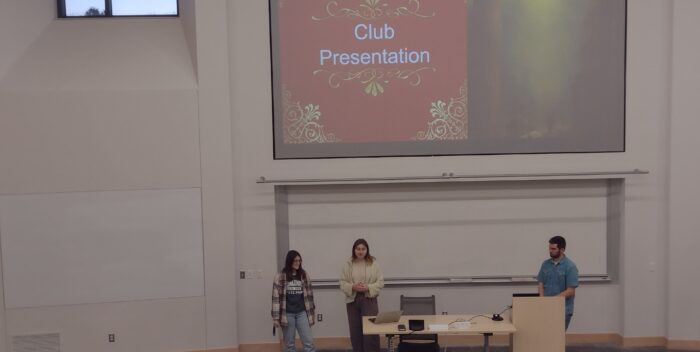Student Senate Approves Social Sciences Club
Photo description: Morgan Fischer, pictured on the left, and Elise Ullestad, on the right, present the Social Sciences Club for Senate approval
Photo credit: Nora Betts
Nora Betts
Sower Staff
The Senate on Tuesday voted with a two-thirds majority to grant the Social Sciences Club official Concordia club standing after a debate about its ability to recruit members and keep the club alive.
Club representatives Elise Ullestad and Morgan Fischer said that the Social Sciences Club officers would all be graduating in the coming two semesters, which led to questions about the club’s membership sustainability.
Senate President Julia Witt said that clubs led exclusively by seniors or upperclassmen often die out when younger students fail to commit to membership.
“I see all of you graduating and I know you have a plan in place, but a lot of times what you see is (that) older people take over, start a club, and they think the younger people are going to take over, and then the younger people don’t and then the club dies,” said Witt. “And we have had a lot of clubs die, like, a year after getting approved.”
Ullestad said that the club plans to host a seminar to prepare students for their future careers in the social sciences, which also will serve as an advertisement for the club.
After the seminar, the club will host a meeting for people interested in joining and discussing future events, Ullestad said. In addition, officer meetings will be held every other week.
Senate members also expressed their concern about the club’s lack of frequent meetings and limited membership.
“The concern that I have is if you guys aren’t meeting frequently enough, then you’re not going to have the consistency of especially new people for engaging with the club,” said Senate member Aaron Fosse.
Witt said that a semester delay in official club recognition might allow the club to better take shape and demonstrate its seriousness and sustainability to the Senate.
Addressing a prospective re-proposal next semester, Witt said the Senate will be able to see that the club is more established and active.
“You’ll for sure have your next officers in line by then, so we might be able to see a group of (club members) that’s not just a bunch of seniors,” Witt said. “So we’ll see younger faces, more members, and more activity, so that just makes us a lot more confident.”
Psychology is the third most popular major on campus, behind Education and Business, both of which have pre-existing clubs.
The Social Sciences Club’s faculty sponsor is Dr. Thaddeus Warren, Concordia’s chair of Human & Social Sciences. Ullestad said that other faculty and staff involved with the club are Dr. Kathy Miller, professor of Sociology, and Daisha Thomas, Director of Student Success.
“Our purpose for the club is to create connections or create community within majors and minors of psychology, sociology, behavioral science, and criminal justice,” Ullestad said.
Maundy Thursday Classes
The Senate reintroduced a previous suggestion by Nathaniel Mars to cancel or reschedule Thursday night classes on Maundy Thursday to allow students to attend evening church services.
Witt said that the next best step would be for the Senate to write a letter of recommendation to the CUNE Cabinet expressing its desire to alter Maundy Thursday classes. Witt and Senate Vice President Alex Vieselmeyer discussed the issue with CUNE administration.
“In Alex and I’s meeting with Dave Kumm, the Chief Financial Officer, earlier this week, it was recommended to us that we write a letter of recommendation from the Student Senate to the presidential cabinet of the university to be able to get that in motion,” Witt said.
Witt said she was looking for members to sign up for a committee to write the letter, get it approved by the whole Senate, and send it to the cabinet, but Senate members debated whether a new committee was needed for the task.
Brooke Lange suggested that one person write the letter rather than form a committee, but Witt said that a committee would get a wider voice on the issue.
Lange said that the Senate should discuss the issue at its meeting after spring break and then delegate the actual letter-writing to one person. The letter is “supposed to represent the entire Student Senate,” Lange said, but one Senate member could then take the points of the discussion and format the letter.
“If you are making the argument that we want everyone’s opinion, then don’t we want everyone’s opinion?” Lange asked.
Witt said she figured it would be best to put the letter together in a committee of three or four people since that is the process for other committees. Normally, such a letter would then be presented to the entire Senate for approval. However, Witt said that a Senate-wide discussion after spring break would be feasible.
Aarin Dean said he was worried about the timeframe for getting things accomplished.
“This is rather time-sensitive. By the time this even gets done with a committee meeting, we’re already halfway through March,” Dean said.
Witt said that the goal of the appeal to the cabinet is to get Maundy Thursday classes changed for next year, not necessarily this year. However, “the sooner we get (the letter sent), the more of a possibility even a slight change for this year would happen,” Witt said.
The Senate motioned to have the whole Senate give input on the content of the letter at the next meeting after spring break.














